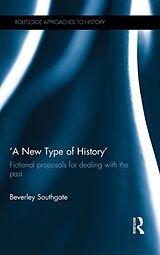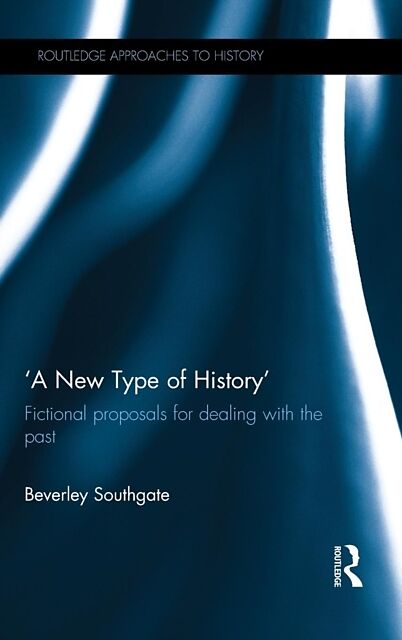'A New Type of History'
Einband:
Fester Einband
EAN:
9781138848030
Untertitel:
Fictional Proposals for dealing with the Past
Autor:
Southgate Beverley
Herausgeber:
Routledge
Anzahl Seiten:
154
Erscheinungsdatum:
2015
ISBN:
978-1-138-84803-0
Linking fiction with history and historical theory, 'A New Type of History': Fictional Proposals for dealing with the Past focuses on a selection of nineteenth- and twentieth-century novelists who have criticized scientifically based history and proposed alternative ways of approaching the past: more subjective and personal, colourful and imaginative, and above all ethically orientated. Providing a new take on both novelists and historiography, and ranging widely from the nineteenth century to the present day, this cross-disciplinary study will be valuable reading for all those interested in the intersection and interplay between fiction and history.
Zusatztext "Beverley Southgate has always sought to open up 'conventional' histories to new possibilities informed by radical ethico-political considerations! and here we see him at his very best..."?Keith Jenkins! Emeritus Professor of Historical Theory! University of Chichester! UK Informationen zum Autor Beverley Southgate is Reader Emeritus in History of Ideas at the University of Hertfordshire. In addition to numerous articles, his publications include History: What & Why? ; Why Bother with History? ; Postmodernism in History ; What is History For? ; History Meets Fiction ; Contentment in Contention: Acceptance versus Aspiration . Klappentext Linking fiction with history and historical theory, 'A New Type of History': Fictional Proposals for dealing with the Past focuses on a selection of nineteenth- and twentieth-century novelists - Tolstoy, Proust, John Cowper Powys, Virginia Woolf, Wyndham Lewis, Penelope Lively, and James Hamilton-Paterson - who have criticized scientifically based history and proposed alternative ways of approaching the past: more subjective and personal, colourful and imaginative, and above all ethically orientated. In this, it is argued, they have been reverting to an earlier rhetorical model for history, which is now being increasingly adopted by practising historians. This 'new type of history' may lack the claimed 'objectivity' and 'truth' of its immediate predecessor, but it opens the way for an ethically focused subject that may be used (in Nietzsche's words) 'for the purpose of life'.Providing a new take on both novelists and historiography, and ranging widely from the nineteenth century to the present day, this cross-disciplinary study will be valuable reading for all those interested in the intersection and interplay between fiction and history. Zusammenfassung Linking fiction with history and historical theory, 'A New Type of History': Fictional Proposals for dealing with the Past focuses on a selection of nineteenth- and twentieth-century novelists Tolstoy, Proust, John Cowper Powys, Virginia Woolf, Wyndham Lewis, Penelope Lively, and James Hamilton-Paterson who have criticized scientifically based history and proposed alternative ways of approaching the past: more subjective and personal, colourful and imaginative, and above all ethically orientated. In this, it is argued, they have been reverting to an earlier rhetorical model for history, which is now being increasingly adopted by practising historians. This 'new type of history' may lack the claimed 'objectivity' and 'truth' of its immediate predecessor, but it opens the way for an ethically focused subject that may be used (in Nietzsche's words) 'for the purpose of life '. Providing a new take on both novelists and historiography, and ranging widely from the nineteenth century to the present day, this cross-disciplinary study will be valuable reading for all those interested in the intersection and interplay between fiction and history. Inhaltsverzeichnis Preface. Acknowledgements . 1. Introduction. 2. Leo Tolstoy (1828-1910) and ethical history. 3. Marcel Proust (1871-1927) and the recovery of 'lost time'. 4. John Cowper Powys (1872-1963) and 'an entirely new genre'. 5. Virginia Woolf (1882-1941) and 'history as it is lived'. 6. Wyndham Lewis (1882-1957) and 'a new type of history'. 7. Penelope Lively (born 1933) and history as 'a construct of the human intellect'. 8. James Hamilton-Paterson (born 1941) and blundering about in the past 'with fading maps'. 9. Conclusion. Bibliography. Index ...
Autorentext
Beverley Southgate is Reader Emeritus in History of Ideas at the University of Hertfordshire. In addition to numerous articles, his publications include History: What & Why?; Why Bother with History?; Postmodernism in History; What is History For?; History Meets Fiction; Contentment in Contention: Acceptance versus Aspiration.
Klappentext
Linking fiction with history and historical theory, 'A New Type of History': Fictional Proposals for dealing with the Past focuses on a selection of nineteenth- and twentieth-century novelists - Tolstoy, Proust, John Cowper Powys, Virginia Woolf, Wyndham Lewis, Penelope Lively, and James Hamilton-Paterson - who have criticized scientifically based history and proposed alternative ways of approaching the past: more subjective and personal, colourful and imaginative, and above all ethically orientated. In this, it is argued, they have been reverting to an earlier rhetorical model for history, which is now being increasingly adopted by practising historians. This 'new type of history' may lack the claimed 'objectivity' and 'truth' of its immediate predecessor, but it opens the way for an ethically focused subject that may be used (in Nietzsche's words) 'for the purpose of life'. Providing a new take on both novelists and historiography, and ranging widely from the nineteenth century to the present day, this cross-disciplinary study will be valuable reading for all those interested in the intersection and interplay between fiction and history.
Zusammenfassung
Linking fiction with history and historical theory, 'A New Type of History': Fictional Proposals for dealing with the Past focuses on a selection of nineteenth- and twentieth-century novelists Tolstoy, Proust, John Cowper Powys, Virginia Woolf, Wyndham Lewis, Penelope Lively, and James Hamilton-Paterson who have criticized scientifically based history and proposed alternative ways of approaching the past: more subjective and personal, colourful and imaginative, and above all ethically orientated. In this, it is argued, they have been reverting to an earlier rhetorical model for history, which is now being increasingly adopted by practising historians. This 'new type of history' may lack the claimed 'objectivity' and 'truth' of its immediate predecessor, but it opens the way for an ethically focused subject that may be used (in Nietzsche's words) 'for the purpose of life'.Providing a new take on both novelists and historiography, and ranging widely from the nineteenth century to the present day, this cross-disciplinary study will be valuable reading for all those interested in the intersection and interplay between fiction and history.
Inhalt
Preface. Acknowledgements. 1. Introduction. 2. Leo Tolstoy (1828-1910) and ethical history. 3. Marcel Proust (1871-1927) and the recovery of 'lost time'. 4. John Cowper Powys (1872-1963) and 'an entirely new genre'. 5. Virginia Woolf (1882-1941) and 'history as it is lived'. 6. Wyndham Lewis (1882-1957) and 'a new type of history'. 7. Penelope Lively (born 1933) and history as 'a construct of the human intellect'. 8. James Hamilton-Paterson (born 1941) and blundering about in the past 'with fading maps'. 9. Conclusion. Bibliography. Index

Leider konnten wir für diesen Artikel keine Preise ermitteln ...
billigbuch.ch sucht jetzt für Sie die besten Angebote ...
Die aktuellen Verkaufspreise von 6 Onlineshops werden in Realtime abgefragt.
Sie können das gewünschte Produkt anschliessend direkt beim Anbieter Ihrer Wahl bestellen.
Loading...
Die aktuellen Verkaufspreise von 6 Onlineshops werden in Realtime abgefragt.
Sie können das gewünschte Produkt anschliessend direkt beim Anbieter Ihrer Wahl bestellen.
| # | Onlineshop | Preis CHF | Versand CHF | Total CHF | ||
|---|---|---|---|---|---|---|
| 1 | Seller | 0.00 | 0.00 | 0.00 |
